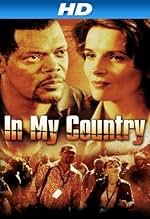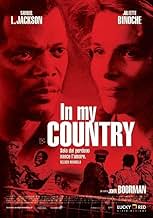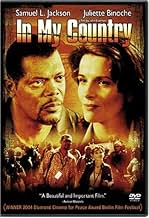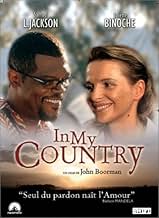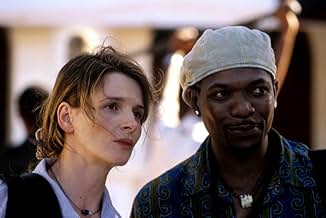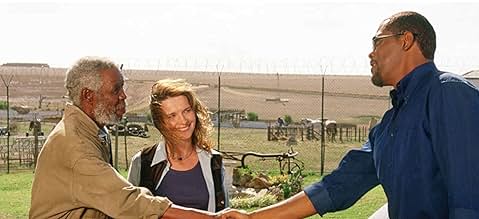A journalist and a poetess meet during the hearings of South African Truth and Reconciliation Commission.A journalist and a poetess meet during the hearings of South African Truth and Reconciliation Commission.A journalist and a poetess meet during the hearings of South African Truth and Reconciliation Commission.
- Director
- Writers
- Stars
- Awards
- 1 win & 3 nominations total
Menzi Ngubane
- Dumi Mkhalipi
- (as Menzi 'Ngubs' Ngubane)
Harriet Lenabe
- Albertina Sobandla
- (as Harriet Manamela)
Dan Robbertse
- Sgt. de Smidt
- (as Daniel Robbertse)
- Director
- Writers
- All cast & crew
- Production, box office & more at IMDbPro
6.03K
1
2
3
4
5
6
7
8
9
10
Featured reviews
A dark drama about murders and torture perpetuated during Apartheid in South Africa.
A black journalist of Washington Post, Langton Whitfield; is sent by provocation by his boss to South Africa in order to "cover" the auditions of proceedings named Truth and Reconciliation Commission, that must decide if murders and torture authors can be amnestied if they say truth on act that they have made and express regrets in face of their victims. Langston encounters a young Afrikaner woman who follows also for South African radio the same sessions. She discovers the horror of Apartheid politics and she is bowled over by these facts. In these circumstances, Langston and Anna bring closer together. It is the story of the deep of human cruelty and also of the power of love and forgetting. The movie is dramatic and well played by Samuel L. Jackson and Juliette Binoche, but seems to be a little too oriented and melodramatic.
While not as powerful as "Hotel Rwanda," John Boorman's look at the relationship between whites and blacks in post-Apartheid South Africa is compelling nonetheless!
Director John Boorman has taken on a weighty and incendiary subject, much like Terry George's recent take on genocide in "Hotel Rwanda." Although "In My Country" is set post-Apartheid, it still covers a hot topic: what do you do with the people that are to blame when a genocide occurs? President Nelson Mandela formed a commission to get at the truth and in return for that information he was offering amnesty for those government officers that were only 'following orders'. An amazing precedent to say the least.
However, director Boorman has chosen to balance the emotional testimony of the victims with a sometimes humorous side-story involving an American journalist, played by the great Samuel L. Jackson ("Coach Carter") and a local 'white' radio reporter, played by the equally great Juliette Binoche ("The English Patient").
Certainly, a story of this import deserves a documentary but as it stands, this is as close as any American will ever get to this story since many newspapers buried it when it originally occurred. Racism is an ugly thing, but forgiveness is a beautiful thing and this movie balances the two in an effective and entertaining manner.
Check this one out, especially if you are a fan of "Hotel Rwanda" and hearing the 'truth' for a change.
However, director Boorman has chosen to balance the emotional testimony of the victims with a sometimes humorous side-story involving an American journalist, played by the great Samuel L. Jackson ("Coach Carter") and a local 'white' radio reporter, played by the equally great Juliette Binoche ("The English Patient").
Certainly, a story of this import deserves a documentary but as it stands, this is as close as any American will ever get to this story since many newspapers buried it when it originally occurred. Racism is an ugly thing, but forgiveness is a beautiful thing and this movie balances the two in an effective and entertaining manner.
Check this one out, especially if you are a fan of "Hotel Rwanda" and hearing the 'truth' for a change.
Side stupid romantic story... RUINED....Main GOOD story..
The performance and production is good, overall is good. its a movie about horrors that happened in south africa by WHITE people or government. The movie has some Major flaws in Side story too.
well its kinda movie about " black lives matter" thing. a married woman with kids has a job in radio. and she want to tell the truth to the country and world about the horrors happened to that country. where she met another black journalist from america. and then they both start working together to reveal more truth but also some romantic feelings which is kinda stupid. maybe she Pity soo much about black people ?.
-----------------spoilers (flaws)---------------
a married woman with two kids, sleeping with and between two black guys in same bed?
and then she kinda fall in love and didnt think about her kids? well because its not in the movie.
in the end the husband is angry but ok with everything ?
if there is no romnatic side story then this movie could done good.
well its kinda movie about " black lives matter" thing. a married woman with kids has a job in radio. and she want to tell the truth to the country and world about the horrors happened to that country. where she met another black journalist from america. and then they both start working together to reveal more truth but also some romantic feelings which is kinda stupid. maybe she Pity soo much about black people ?.
-----------------spoilers (flaws)---------------
a married woman with two kids, sleeping with and between two black guys in same bed?
and then she kinda fall in love and didnt think about her kids? well because its not in the movie.
in the end the husband is angry but ok with everything ?
if there is no romnatic side story then this movie could done good.
Cannot be faulted for taking on the subject matter but there's too much non-Apartheid activity going on here.
It's a shame that I didn't get the emotional punch I felt as if I was supposed to have when watching In My Country, Country of my Skull to many others. You cannot force emotion and you cannot force an opinion on a film so whilst In My Country is nicely unfolded and is visually engaging for what it is, the fact that some people are pouring their hearts out in apparent regret at various points over horrific prior activity and I'm not feeling the pinch, I suppose you have to consider the film a minor failure.
But why is it that In My Country doesn't pack the necessary heat to make one identify and feel upset for the characters on screen? I think a lot of it is down to the overall approach director John Boorman adopts. The film feels like several things at once rather than an actual case-study of post-Apartheid era events that will change and affect lives just as lives were changed and affected during the era. You might argue that the best way to tackle historical issues that deal with human cruelty to other humans is to set whatever story or narrative you're doing during the actual time thus giving a first hand account of what went down and how. Many films have done this in the past but films such as The Pianist and perhaps more notably The Deer Hunter are so vast in their scale that they manage to cover life prior to 'the event'; the event(s) themselves and then the aftermath of it all through either escape or returning to their former lives before 'the event'.
Interestingly, both those films look at prisoner of war scenarios, Jews to the Nazis and Americans to the Vietnamese, respectively. In My Country is more a look at what happens after 'the event', that being the Apartheid and all the atrocities that befell South Africa midway through the twentieth century. Trouble here is that the best the rest of the world can do here is show up, look glum at a couple of press conferences in which South African men of the law admit what they did and then report on the confessions, something that one character cannot even get much space for in his respective newspaper.
As a film alone, In My Country works as a re-telling of events that happened after an atrocity but it never delves deep into its subject matter. The Apartheid and the people involved in the Apartheid are not the central characters in fact they are relegated to giving accounts at timely spaced intervals throughout the film that hope to produce the odd tear from the audience. Families of the victims bursting into tears and music native to Africa that balres up try to add to the emotion felt in these scenes. But that's about as good as it gets with the rest of it crossing genres in and out of romance, historical, melodrama and the overall approach that gets tangled up that is the docu-drama.
At its very centre, In My Country has an American journalist named Langston Whitfield (Jackson) travelling to a country to cover events few people will have an interest in. It's interesting that a film dealing with the post-Apartheid era would have an American at its core as the lead male and not a South African. There is a South African lead of sorts but they are female and they are pulled up by Whitfield on more than one occasion about the treatment they gave the black inhabitants of the nation. Here there is a confused triangle of conflict; Whitfield is American and complains about Anna Malan's (Binoche) nation's treatment of blacks but as an American he could be read into as representing America, a powerful nation that did nothing about the Apartheid anyway. Then there is the fact Whitfield is black himself and his beef with Malan's nation's treatment of blacks could just be something personal.
The fact Malan is female in the first place immediately relegates her from what she would have been had the character been male. As a male, Malan would have made a good foil for Whitfield and the personal prejudice might not have existed as much. It's no secret that women in films have always been lowered somewhat when pitted against men indeed theorists have argued that all films are shot for the male audience in mind so women view things through a male perspective when watching a film. But the fact sexual tension is present in the film between these two adds another layer of confusion and opens up the possibility that the film could fall into the romance as well as the, shock, 'buddy' genre. They fit the bill in the sense they are binary opposites to one another (black/white; male/female; American/South African, etc.) and rebound dialogue off one another but is there really space for 'buddy' content in a film about post-Apartheid South Africa?
Twinned with this, there are other sloppy instances that aid the film in its mediocrity. When we first get an introduction of any sorts of chief villain De Jager (Gleeson), it is a visit to his house at night; complete with eerie music and we see a lot of animal heads on his wall he must be a baddie. As well as this clumsy labelling, De Jager's press conference right nearer the end does not act as the final moral catalyst for the film but rather as a plot point for Anna's family to ultimately fall apart which was unfortunate. While it's all nicely unfolded and cute for what it is, In My Country bogs itself down with confused studies and feels like a missed opportunity.
But why is it that In My Country doesn't pack the necessary heat to make one identify and feel upset for the characters on screen? I think a lot of it is down to the overall approach director John Boorman adopts. The film feels like several things at once rather than an actual case-study of post-Apartheid era events that will change and affect lives just as lives were changed and affected during the era. You might argue that the best way to tackle historical issues that deal with human cruelty to other humans is to set whatever story or narrative you're doing during the actual time thus giving a first hand account of what went down and how. Many films have done this in the past but films such as The Pianist and perhaps more notably The Deer Hunter are so vast in their scale that they manage to cover life prior to 'the event'; the event(s) themselves and then the aftermath of it all through either escape or returning to their former lives before 'the event'.
Interestingly, both those films look at prisoner of war scenarios, Jews to the Nazis and Americans to the Vietnamese, respectively. In My Country is more a look at what happens after 'the event', that being the Apartheid and all the atrocities that befell South Africa midway through the twentieth century. Trouble here is that the best the rest of the world can do here is show up, look glum at a couple of press conferences in which South African men of the law admit what they did and then report on the confessions, something that one character cannot even get much space for in his respective newspaper.
As a film alone, In My Country works as a re-telling of events that happened after an atrocity but it never delves deep into its subject matter. The Apartheid and the people involved in the Apartheid are not the central characters in fact they are relegated to giving accounts at timely spaced intervals throughout the film that hope to produce the odd tear from the audience. Families of the victims bursting into tears and music native to Africa that balres up try to add to the emotion felt in these scenes. But that's about as good as it gets with the rest of it crossing genres in and out of romance, historical, melodrama and the overall approach that gets tangled up that is the docu-drama.
At its very centre, In My Country has an American journalist named Langston Whitfield (Jackson) travelling to a country to cover events few people will have an interest in. It's interesting that a film dealing with the post-Apartheid era would have an American at its core as the lead male and not a South African. There is a South African lead of sorts but they are female and they are pulled up by Whitfield on more than one occasion about the treatment they gave the black inhabitants of the nation. Here there is a confused triangle of conflict; Whitfield is American and complains about Anna Malan's (Binoche) nation's treatment of blacks but as an American he could be read into as representing America, a powerful nation that did nothing about the Apartheid anyway. Then there is the fact Whitfield is black himself and his beef with Malan's nation's treatment of blacks could just be something personal.
The fact Malan is female in the first place immediately relegates her from what she would have been had the character been male. As a male, Malan would have made a good foil for Whitfield and the personal prejudice might not have existed as much. It's no secret that women in films have always been lowered somewhat when pitted against men indeed theorists have argued that all films are shot for the male audience in mind so women view things through a male perspective when watching a film. But the fact sexual tension is present in the film between these two adds another layer of confusion and opens up the possibility that the film could fall into the romance as well as the, shock, 'buddy' genre. They fit the bill in the sense they are binary opposites to one another (black/white; male/female; American/South African, etc.) and rebound dialogue off one another but is there really space for 'buddy' content in a film about post-Apartheid South Africa?
Twinned with this, there are other sloppy instances that aid the film in its mediocrity. When we first get an introduction of any sorts of chief villain De Jager (Gleeson), it is a visit to his house at night; complete with eerie music and we see a lot of animal heads on his wall he must be a baddie. As well as this clumsy labelling, De Jager's press conference right nearer the end does not act as the final moral catalyst for the film but rather as a plot point for Anna's family to ultimately fall apart which was unfortunate. While it's all nicely unfolded and cute for what it is, In My Country bogs itself down with confused studies and feels like a missed opportunity.
Better than many overseas reviewers realise
This movie is flawed, but it's not over-dramatic or misleading. The grieving style of the victims is very realistic. The TRC scenes are a dead ringer for the real thing, and I HAVE seen both. The idea of Ubuntu is simple and the movie doesn't "oversimplify it". It also doesn't state that all South Africans believe in Ubuntu - far from it. It's odd that so many overseas reviewers think they know that the movie is pandering to them and oversimplifying Africa. Cleary it's not simplifying it enough! Sure, having overseas actors means it's a bit foreign, but if there weren't big name international stars in it you might not be able to find the damn thing on this site. oh, and by the way, Realise is spelled with an S in Africa.
Did you know
- TriviaAfter seeing this film Nelson Mandela called it, "a beautiful and important film about South Africa's Truth and Reconciliation Commission. It will engage and influence not only South Africans, but people all over the world concerned with the great questions of human reconciliation, forgiveness, and tolerance."
- GoofsAll number plates on vehicles throughout the film (apart from archival footage) are fake and do not follow the format of older South African number plates.
- Quotes
Anna Malan: [last lines - voiceover] Because of you, this land no longer lies between us but within. It breathes becalmed, after being wounded in its wondrous throat. In the cradle of my skulll it sings, it ignites my tongue. Five thousand stories are scorched on your skin. I am changed forever.. I want to say, forgive me, forgive me, forgive me.
- ConnectionsEdited into In My Country: Deleted Scenes (2005)
- SoundtracksSenzenina
Arranged by Murray Anderson & Warrick Swinney
Performed by Princess Soi-Soi Gqeza, Mxolisi Mayekane, Mandia Lande, Michael Ludonga, Simpiwe Matole & The New Teenage Gospel Choir
Published by Hi-Z Sound
- How long is In My Country?Powered by Alexa
Details
- Release date
- Countries of origin
- Official sites
- Languages
- Also known as
- Country of My Skull
- Filming locations
- Production companies
- See more company credits at IMDbPro
Box office
- Budget
- $12,000,000 (estimated)
- Gross US & Canada
- $163,893
- Opening weekend US & Canada
- $22,383
- Mar 13, 2005
- Gross worldwide
- $1,491,434
- Runtime
- 1h 45m(105 min)
- Color
- Sound mix
- Aspect ratio
- 1.85 : 1
Contribute to this page
Suggest an edit or add missing content


